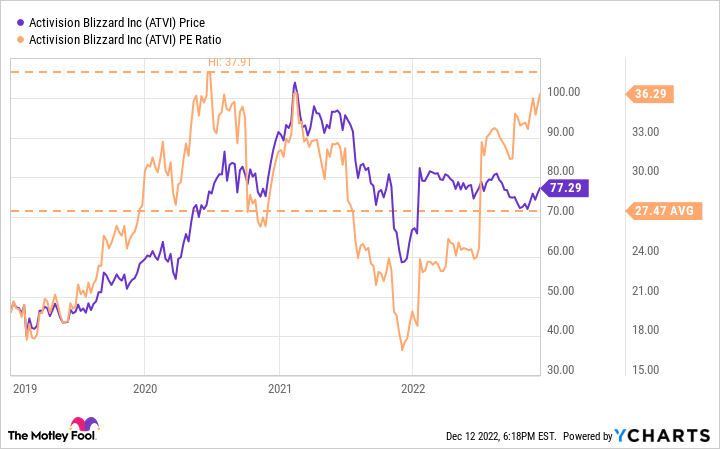Nearly a year ago, Microsoft (MSFT 0.37%) announced its intentions to purchase Activision Blizzard (ATVI) for $95 per share. Considering Activision shares are currently trading for roughly $77, there is an implied 23% upside here. It doesn't take a genius to realize there's money to be made here. This type of action is called arbitrage, which means purchasing an asset at a discount to its buyout price to flip it when it reaches its full potential.
Warren Buffett's Berkshire Hathaway got in on this opportunity earlier this year, and the company currently holds a 7.7% stake in Activision (roughly 1.4% of Berkshire's investment portfolio).
Following Buffett's lead and buying the stock with a tangible 23% short-term upside seems too good to be true. But is it?
It's not a done deal
Activision is trading at such a discount because there is some real market skepticism that the deal will go through. On Dec. 8, the Federal Trade Commission (FTC) announced its intentions to block the acquisition in court, citing concerns about Microsoft's history of purchasing gaming companies and ending support for rival consoles.
Activision's most prominent franchise is Call of Duty, the third-best-selling video game franchise of all time. However, ending support for the Xbox's rival console, the PlayStation made by Sony, could make this a monopolistic space, which is why the FTC is moving to block it. To Microsoft's credit, the company offered Sony a 10-year deal to keep Call of Duty on its console, but what happens after that remains to be seen.
Additionally, the deal is facing scrutiny overseas, with the European Union launching an antitrust probe into the acquisition back in November.
There's a lot of uncertainty with this deal, which is why the stock trades at such a massive discount to its buyout price. Buffett's company also understands this, which could be why it sold about 17% of its Activision stake in the third quarter. While completing this deal is still tricky, Microsoft hasn't thrown in the towel yet, showing its commitment to closing this transaction.
But what happens if the deal fails?
Activision Blizzard's business hasn't been all that great recently
If the deal fails, you'll still own your Activision Blizzard stock, but expect some price drop immediately after the announcement as traders and others rush out of the stock. Additionally, at the stock's current valuation, its price-to-earnings ratio is near a four-year high and well above its average, further influencing a downward drop.

If the deal is called off, the stock may revert to the pre-announcement share price level of around $60, but that's just a guess.
Business at Activision hasn't been strong either.

ATVI Revenue (Quarterly YOY Growth) data by YCharts.
With falling margins, negative revenue growth, and a high valuation, Activision Blizzard doesn't look like a stock I'd want to own. This is why I'm not trying to play the arbitrage game.
If you do think this deal will go through and aren't concerned with owning Activision Blizzard stock if it doesn't, there's one last implication to be discussed: taxes. If you purchase Activision's stock now and the deal closes within a year of purchase, you'll owe short-term capital gains on the investment, which taxes any gains at your tax bracket rate, not a long-term investment one. You'll still make a profit, but Uncle Sam will get a larger cut than if you held the stock for longer than a year.
Another potential concern is opportunity cost -- what your money could have been doing in the meantime. Plenty of other stocks of strong businesses were decimated in this bear market but are poised for a strong recovery. If these investments return greater than the Activision Blizzard arbitrage play, your money is better placed there.
Arbitrage investments can be tricky, so I'd rather leave them to the professionals like Warren Buffett.





